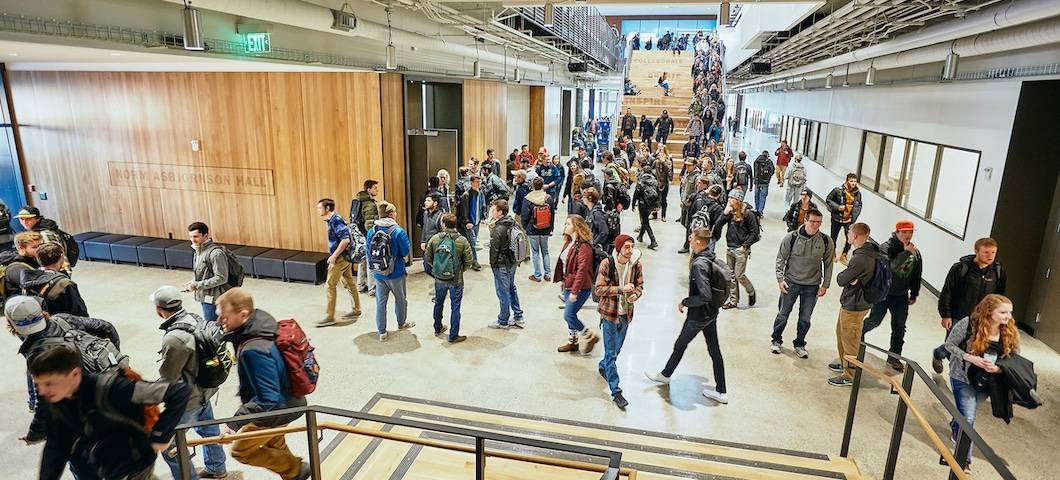Our College
At A Glance
The Norm Asbjornson College of Engineering is at the core of MSU's land-grant mission, providing an inclusive, hands-on learning environment that supports academic excellence, strives for innovation in research and serves the community in Montana and beyond.
Learning
Our degree programs in five departments include a range of undergraduate majors, minors, and graduate programs.Discovery
Our research expenditures were $18 million in 2021. Our research entities include world-class centers and laboratories.Engagement
Our outreach includes community events, capstone projects, and programs like Empower.
For more details, see the NACOE Viewbook highlighting the college's research, academic opportunities, student support resources and more.
Mission, Vision, Core Values, Planning
The Norm Asbjornson College of Engineering at Montana State University will serve the State of Montana and the nation by
- fostering lifelong learning
- integrating learning and discovery
- developing and sharing technical expertise
- empowering students to be tomorrow's leaders
The Norm Asbjornson College of Engineering at Montana State University will be an outstanding collaborative community that achieves excellence in learning, innovation, discovery, and knowledge transfer. To realize this vision, the college will
- Leverage shared interests and talents among faculty and students in order to create knowledge across disciplinary lines.
- Effectively and efficiently balance breadth with depth in undergraduate education in order to prepare students for the global workforce.
- Be a leader in innovation and discovery in our identified focus areas.
- Successfully integrate research and innovation into the learning experience of both undergraduate and graduate students.
- Be recognized for the level of knowledge transfer to industry, governments, and citizens in the state of Montana.
Life-long learning
The college is a community that believes in and fosters life-long learning in all of its members—undergraduate students, graduate students, faculty, and staff. Life-long learning also extends beyond the college community to state and national constituencies.
Knowledge Discovery
At the heart of the college community’s activities are knowledge discovery and dissemination and the creativity that accompanies these activities. We believe that knowledge discovery informs and enriches the life-long learning of the entire college community.
Collaboration
We believe that collaboration and collegiality both inside and outside of our college community enrich all college activities.
Inclusiveness
The college is a community that welcomes and encourages diverse points of view and backgrounds, believing that this inclusiveness enriches our creative learning environment.
Professionalism
The Norm Asbjornson College of Engineering community approaches all activities with a high degree of professionalism, working with integrity, honesty, and commitment to excellence.
Accreditation
The appropriate commissions have accredited the undergraduate programs in the Norm Asbjornson College of Engineering at Montana State University-Bozeman as listed in the following sections.
The following engineering programs are accredited by the Engineering Accreditation Commission of the Accreditation Board for Engineering and Technology, Inc., known as ABET:
- Chemical Engineering
- Civil Engineering
- Computer Engineering
- Electrical Engineering
- Industrial Engineering
- Mechanical Engineering
The following engineering technology programs are accredited by the Technology Accreditation Commission of ABET:
- Construction Engineering Technology
- Mechanical Engineering Technology
The bachelor’s degree in Computer Science has two options: a professional option and an interdisciplinary option. The bachelor's degree is accredited by the Computing Accreditation Commission of ABET.
ABET conducted site visits for each program in the fall of 2015.
Engineering Advisory Council
MSU's Engineering Advisory Council (EAC) provides an industry perspective to the college in its strategic planning, with a goal of improving the quality of the academic and research programs; enhancing the effectiveness of its graduates; encouraging life-long learning and assisting in the mobilization of new financial resources to support the development of innovative programs.

